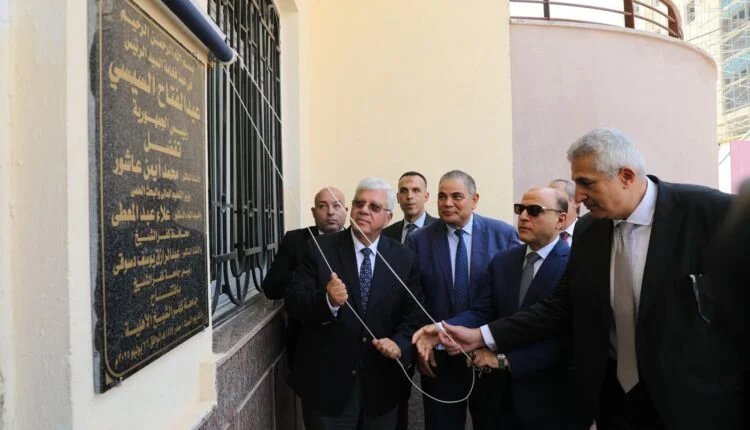
Egypt’s Minister of Higher Education and Scientific Research, Dr. Ayman Ashour, officially inaugurated the new Kafr El-Sheikh National University on Saturday in a ceremony attended by local officials and academic leaders.
The move comes as part of a broader national effort to expand non-profit university education in the country.
Dr. Ashour was accompanied by Kafr El-Sheikh Governor Major General Alaa Abdel-Moaty, University President Dr. Abdelrazek Desouky, and Dr. Mostafa Refaat, Secretary General of the Supreme Council of Universities.
The minister toured the university’s modern facilities, including two academic buildings equipped with state-of-the-art infrastructure.
The first building features a ground floor and six upper levels, housing administrative offices, 17 classrooms for 45 students, 13 for 65 students, 7 for 120 students, 4 lecture halls for 350 students, a seminar hall, 12 laboratories, and eight control rooms.
The second building, dedicated to lecture halls and electronic testing, spans three floors with eight 350-seat lecture theatres and multiple classrooms, as well as electrical and administrative rooms.
Dr. Ashour emphasized the government’s strong support for non-profit universities, citing their role in accommodating increasing student numbers, curbing academic migration abroad, and delivering high-quality education.
“The relationship between public and national universities is one of integration and cooperation,” he said, urging all institutions to offer modern interdisciplinary programs and innovative administrative models, including vice presidents dedicated to academic affairs, international partnerships, and entrepreneurship.
With the addition of 12 new institutions, the total number of national universities in Egypt now stands at 32. These include Kafr El-Sheikh, Damietta, Suez, Damanhour, Cairo, Ain Shams, Sohag, New Valley, Fayoum, Tanta, Luxor, and Sadat City National Universities. The academic year for these new universities will commence in 2025–2026.
Governor Abdel-Moaty hailed the new university as a “major educational addition” for the Delta region, underlining its role in reducing student migration, fostering urban expansion, and supplying the region with skilled graduates.
He reaffirmed the governorate’s commitment to supporting educational advancement and innovation.
Dr. Desouky confirmed that the university was established by Presidential Decree No. 248 and includes 13 faculties, such as Medicine, Dentistry, Pharmacy, Physical Therapy, Nursing, Veterinary Medicine, Engineering, Computer Science and AI, Sciences, Agriculture, Business, Humanities, and Arts & Design.
He stressed that the institution is part of Egypt’s national strategy to deliver globally competitive university education and prepare students for the labor market through modern curricula and diverse skill development.
According to Dr. Adel Abdel-Ghaffar, Media Advisor and Official Spokesman of the Ministry, all newly established national universities are equipped with advanced digital tools, laboratories, and smart classrooms.
He highlighted growing student interest, attributing it to trust in the quality and relevance of the programs.
“These universities are not profit-driven,” Dr. Abdel-Ghaffar noted. “Revenues are reinvested into laboratories, workshops, infrastructure, and ongoing maintenance. They also play a pivotal role in developing new urban communities.”
The rapid expansion of national universities marks a major transformation in Egypt’s higher education landscape, offering inclusive, future-ready education aligned with local and international demands.



